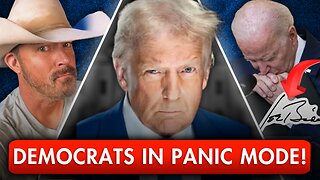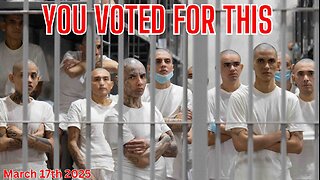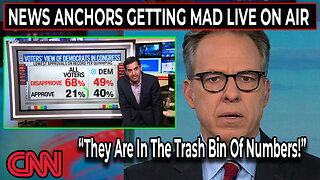Premium Only Content

Who Pays Tariffs?
Cause Before Symptom - With Your Host James Carner
Who Pays Tariffs?
A tariff act is a law that imposes a tax on imported goods. These taxes, called tariffs, increase the price of imported products, making them less competitive compared to domestically produced goods.
Traditionally, the importer of the goods is responsible for paying the tariff to the customs authority. However, the economic burden of a tariff can be shared between the importer, the foreign producer, and the domestic consumer.
Importer: The importer may absorb the cost of the tariff to remain competitive, reducing their profit margin.
Foreign Producer: The foreign producer may lower their selling price to offset the tariff and maintain market share.
Domestic Consumer: In many cases, the domestic consumer ends up paying the tariff indirectly through higher prices for the imported goods.
Tariffs can have various effects on the economy:
* Protectionism: Tariffs protect domestic industries from foreign competition, allowing them to charge higher prices and potentially reduce quality.
* Reduced Trade: Tariffs can lead to retaliation from other countries, reducing overall trade and harming economic growth.
* Inflation: By increasing the cost of imported goods, tariffs can contribute to inflation.
* Job Creation: In theory, tariffs can protect domestic jobs, but they can also lead to job losses in other sectors.
During the Depression, Republicans introduced the tarriff bill to stifle inflation but it didn’t work. It made it much worse because the importers, or american companies, had to pay more to get cheaper goods thus having to raise prices.
When a president talks Tarriffs, it is a tax on american companies. If you have to pay more for goods, your prices go up.
There are two way to look at this. 1.) Trump is at war with the corporations as this will force them to pay taxes, but the corporations can tell the countries they are importing from to share or pay the cost. Regardless, the taxes will be paid.
And 2.) even if it hits large corporations hard, it still affects small to medium sized businesses because they will pay the tax too. I’ve heard Trump wants to eliminate the income tax and raise the tariffs to offset the shortage the government receives from 30% of all our wages.
Here is how it would affect large businesses. Let’s say a major candy bar maker. It wouldn’t matter where they manufacture the products, any of the ingredients imported in will be taxed. Chocolate beans, for example would be taxed based on weight and this will hurt the candy maker and force them to make changes to offset the new costs. Most likely the candy bar manufacturer will just raise their price for candy. This doesn’t sound that bad until you realize 90% of everything on the market who imports from China will raise their prices. This means more inflation.
The small business who pays the import tariff could make some changes inside their business to offset the cost, but most likely, they will raise their prices since 90% of everyone else did so.
No, the Smoot-Hawley Tariff Act of 1930 did not work. In fact, it is widely considered to have worsened the Great Depression.
Here's why:
* Protectionism Backfired: The intent was to protect American industries from foreign competition. However, other countries retaliated with their own tariffs, leading to a decline in global trade.
* Reduced Demand: Higher tariffs made imported goods more expensive, reducing consumer demand and hurting businesses.
* Economic Contraction: The decrease in trade and economic activity further deepened the Depression.
The Smoot-Hawley Tariff is often cited as a prime example of how protectionist measures can have negative consequences for the global economy.
The same thing will apply to our current situation as we are definitely in a recession yet the authorities dare not call it a depression. The reason is the market hasn’t really crashed yet. But the market then is different than the market of today. Speeds of trade and laws are different.
This means if the markets were to crash like the Great Depression, it would actually be much worse and maybe for longer since the market has been overvalued by quadrillions. A 3 bedroom house in California should not cost 2 million when the true value is $120,000. If the market crashes, all wealth from the middle class will become extinct.
So who really pays the tariffs? Not big business. We do. The Smoot-Hawley Tariff Act of 1930, a piece of legislation designed to protect American industries during the Great Depression, ultimately proved to be a disastrous miscalculation. While the intentions behind the act were rooted in a desire to shield domestic producers from foreign competition, its implementation had far-reaching and detrimental consequences for the global economy.
The core principle behind protectionist policies like the Smoot-Hawley Tariff is the belief that by imposing high tariffs on imported goods, domestic industries can be shielded from competition, thereby stimulating economic growth and job creation. This approach is based on the mercantilist economic theory, which posits that a nation's wealth is maximized by maximizing exports and minimizing imports.
In the context of the Great Depression, proponents of the Smoot-Hawley Tariff argued that it would help to restore economic stability by protecting American industries from cheap foreign goods. They believed that by increasing the cost of imported goods, consumers would be more likely to purchase domestically produced products, thereby boosting demand and stimulating economic activity. Additionally, they argued that the tariff would help to protect American jobs by reducing competition from foreign workers.
However, the reality proved to be far different. The imposition of high tariffs on American imports led to retaliatory tariffs from other countries, triggering a trade war that significantly reduced global trade volumes. As a result, the demand for American exports plummeted, leading to job losses and economic decline in many sectors. Moreover, the higher prices of imported goods increased the cost of production for American businesses, making them less competitive in both domestic and international markets.
The Smoot-Hawley Tariff also had a profound impact on American agriculture. Many farmers, already struggling with low commodity prices and high debt, were unable to export their goods due to the retaliatory tariffs imposed by other countries. This led to a further decline in agricultural incomes and exacerbated the rural depression.
In conclusion, the Smoot-Hawley Tariff Act, while well-intentioned, ultimately proved to be a major contributor to the deepening of the Great Depression. By exacerbating global trade tensions and hindering economic recovery, the act serves as a cautionary tale about the dangers of protectionist policies. It highlights the importance of free trade and open markets in promoting economic growth and prosperity.
Last year, America imported 3.9 Trillion worth of goods and service. President Donald Trump has proposed to implement a universal baseline tariff on imports when he takes office. The Tax Foundation estimated a 10 percent universal tariff would raise $2 trillion and a 20 percent universal tariff would raise $3.3 trillion from 2025 through 2034, before factoring in how the taxes would shrink the US economy. In 2025, a 10 percent universal tariff would increase taxes on US households by $1,253 on average and a 20 percent universal tariff would increase taxes on US households by $2,045 on average. Revenue raised by tariffs would fall well short of what is needed to fully offset the revenue losses of making the expiring provisions of the 2017 Tax Cuts and Jobs Act (TCJA) permanent.
To estimate how much revenue a universal tariff raises, we start with a baseline projection of goods imports over the next decade. Imposing a tax on imports would reduce purchases of foreign-produced goods, resulting in fewer imports. We apply an import elasticity of -1 to project how imports would fall in response to a 10 percent tariff and a 20 percent tariff. How much imports shrink thus varies with the applied tariff rate, implying that doubling the rate does not double the revenue.
From there, we multiply the import tax base by the inclusive tariff rate (the rate divided by one plus the rate) to estimate initial customs duty revenue raised under perfect compliance before making an adjustment to reflect an 85 percent compliance rate, which represents the average tax gap. After compliance adjustments, but before accounting for income and payroll tax offsets, we estimate a 10 percent universal tariff would generate $2.7 trillion of customs duty revenues and a 20 percent universal tariff would generate $4.5 trillion of customs duty revenues.
The total revenue raised will be less than the customs duty revenue generated by the tariff because tariffs reduce incomes, and thus reduce income and payroll tax collections. Accounting for income and payroll tax offsets, our conventional revenue estimate finds that the 10 percent tariff would generate $2 trillion of increased revenue, while the 20 percent tariff would generate $3.3 trillion over a decade.
Because both taxes would shrink the size of the US economy, the dynamic scores are smaller: $1.7 trillion for the 10 percent tariff and $2.8 trillion for the 20 percent tariff. If foreign countries retaliate, even partially, to the US-imposed tariffs, revenue will fall further as the economy shrinks even more. For example, we estimate a 10 percent tariff on all US exports would shrink tax revenues on a dynamic basis by more than $190 billion over 10 years
Based on the conventional revenue estimates for 2025, a 10 percent tariff would increase taxes on US households by $1,253 on average and a 20 percent tariff would increase taxes on US households by $2,045 on average.
Some policymakers may want to use the revenue generated by tariffs to offset the revenue losses from extending the expiring provisions of the 2017 Tax Cuts and Jobs Act (TCJA). Using Tax Foundation’s General Equilibrium Model, we estimate that making the individual provisions of the TCJA permanent would reduce federal tax revenue by $3.4 trillion, the estate tax
provisions by $200 billion, and the business tax provisions by $643 billion, for a combined $4.2 trillion revenue loss over the next decade.
Universal tariffs of 20 percent would not raise enough revenue to offset the revenue loss of individual permanence alone. But those same tariffs would cause enough economic damage, especially if met with any foreign retaliation, to offset the entire economic benefit of making the individual provisions permanent. In other words, attempting to “pay for” making the individual provisions permanent by imposing universal baseline tariffs would cause a net reduction in tax revenues and economic output, while simultaneously increasing the tax burden on lower- and middle-income taxpayers.
Lawmakers will need to pursue fiscal responsibility as they address the tax law expirations, but fiscal responsibility requires finding sound ways to pay for spending priorities. Tariffs don’t make the cut.
Trump is going to make things worse. And his move to hire all of the right wing talk heads from Congress and senate is insane. Sure, it makes the right feel like he’s listening to his constituents, but remember, he’s a Freemason and a Zionist. He’s just doing the will of the Lord of the air. And on top of that, he’s fooling the people. Those who support him think China is paying those tariffs. He said he wouldn’t raise taxes but this is the opposite.
In fiscal year 2023, the US federal government collected just under $2.18 trillion in income taxes, which accounted for 48.7% of its total revenue. In fiscal year 2023, the US federal government spent approximately $6.1 trillion. In fiscal year 2023, the US federal government collected approximately $4.44 trillion in total revenue. Notice anything? There is over 2 trillion that the feds borrow a year. This is just the federal government. Not including states and corporations which brings the national debt to 36 trillion. I think I understand what Trump is trying to do.
For the people, he will cut the income tax and that will give them the idea of liberty. 30 - 40% of their moneies will come back to them. The idea is the people will invest into themselves and not put that 2.17 trillion into China. Bold, but you need to convince the ordinary average citizen to invest in America alone. That means every American should boycott any of the corporation goods, which is 90% of all commondities. Since the 2 trillion will stay in america a year, it gives us the bloodline support we need to make american great again. sounds good, but corporations
Think of it like this. Let’s say you have 4 humans with blood pumping inside them. The blood is your lifeline. The cash is the blood. 2 of your human friends asks for 20% of your blood. In excchange, they give you a hat, coat and some shoes. Now, you are operating at 60% blood. It will take some time for you to generate more blood to get you up to 100% again. The last person of the four offers you a car for 20%. You’re now down to 40% and you will not be able to drive your car or wear your hat until you can generate more blood to survive.
According to AI, for the past 70 - 80 years, America has been operating on around 50% of US dollars which are held outside the US, and the other 50% are within the US. However, this is a very rough estimate, and the actual percentage can vary. Tell me, can you live on 50% of blood? A healthy adult can typically lose up to 15% of their blood volume without experiencing severe, life-threatening consequences. However, even this amount of blood loss can lead to symptoms like dizziness, fatigue, and rapid heart rate. Beyond 15%, the risk of shock and organ damage increases significantly. Significant blood loss beyond 30-40% is often fatal without immediate medical intervention.
Consumers spend approximately 16 trillion dollars a year on goods and services in America. A significant portion of that apparently stays in the US. According to the the latest numbers ss of 2023, the total value of US currency in circulation was around $2.3 trillion. This figure includes both physical cash and digital currency. The same amount that thinks we can double by keeping spending in America.
It’s weird that the big number everyone is focusing on is the same number as the income tax. I am not an economist nor do I care about it much. But if I were Trump, I would just eliminate the income tax altogether and let the fed figure out how to get their money. The military alone needs 1 trillion a year. I would bet that of the 6.1 trillion that the fed spends, they can cut enough to make up for the loss of 2 trillion. But that will not happen. The Federal Reserve will never allow that nor will the military industrial complex.
There is a scheme here and 2 trillion is the target. When Trump puts tariffs of up to 20%, the top ten companies will make the American pay for it. Who are the top ten? Alphabet, Apple, Microsoft, Amazon, Meta (formerly Facebook), Berkshire Hathaway, Johnson & Johnson, Procter & Gamble, Nestlé and Walmart will most definitely raise their prices. And where do they get all their goods? Since they receive goods from, China, India, Japan, South Korea, Germany, Brazil, Australia and Canada to make thier products, they most certainly will be holding emergency meetings trying to figure out how to keep the cost of goods down and pay 20% in taxes.
The Double-Edged Sword of Tariffs: A Complex Economic Debate
Tariffs, taxes imposed on imported goods, have been a contentious issue in economic policy for centuries. While they may seem like a straightforward solution to protect domestic industries and create jobs, their impact on the economy is far more complex.
On one hand, tariffs can provide a temporary boost to domestic industries by shielding them from foreign competition. This can lead to increased production, job creation, and higher wages in specific sectors. Additionally, tariffs can generate revenue for the government, which can be used to fund public services or reduce other taxes.
However, the long-term consequences of tariffs are often negative. By raising the price of imported goods, tariffs increase the cost of living for consumers. This can lead to inflation and reduce consumer purchasing power. Moreover, tariffs can trigger retaliatory measures from other countries, leading to a trade war that harms both economies involved.
Perhaps the most significant drawback of tariffs is their negative impact on economic efficiency. Free trade allows countries to specialize in producing goods and services in which they have a comparative advantage. Tariffs disrupt this natural flow of trade, leading to inefficient allocation of resources and reduced economic growth.
Furthermore, tariffs can stifle innovation. When businesses are protected from foreign competition, they may have less incentive to invest in research and development. This can lead to lower productivity growth and a decline in the overall competitiveness of the economy.
In conclusion, while tariffs may offer some short-term benefits, their long-term costs often outweigh the gains. A more sustainable approach to economic growth is to promote free trade, invest in education and infrastructure, and encourage innovation. By fostering a competitive environment, countries can achieve higher levels of prosperity and well-being for their citizens.
Potential Benefits of Tariffs:
1. Protection of Domestic Industries: Tariffs can protect domestic industries from foreign competition, allowing them to grow and develop.
2. Job Creation: In theory, tariffs could lead to job creation in domestic industries as consumers shift towards domestically produced goods.
3. Increased Government Revenue: Tariffs can generate revenue for the government.
Potential Drawbacks of Tariffs:
1. Higher Prices for Consumers: Tariffs increase the cost of imported goods, leading to higher prices for consumers.
2. Reduced Consumer Choice: Tariffs can limit consumer choice by reducing the availability of foreign goods.
3. Retaliation from Trading Partners: Other countries may retaliate with their own tariffs, leading to a trade war that harms both economies.
4. Reduced Economic Efficiency: Tariffs can distort market forces and reduce overall economic efficiency.
5. Negative Impact on Export-Oriented Industries: Tariffs can lead to higher costs for domestic exporters, making their products less competitive in foreign markets.
There are more drawbacks than benefits here. Tariffs would work if they are initiated in the first two years. Then pull back and let things settle down. But the corporations are the ones in control of this mess. Especially Blackrock, State Street and Vanguard. They would make no move using the government without profit. They have to make a shekel.
While BlackRock, Vanguard, and State Street, as asset management firms, don't directly benefit from tariffs, they can be indirectly impacted by their economic consequences.
Here's how:
1. Market Volatility: Tariffs can introduce uncertainty into the market, leading to increased volatility in stock prices. This volatility can create opportunities for these firms to profit through active trading strategies or by providing investment products that hedge against market risks.
2. Shifts in Investment Flows: Tariffs can lead to shifts in investment flows as investors adjust their portfolios to account for the changing economic landscape. These shifts can create new investment opportunities for these firms.
3. Impact on Client Portfolios: As these firms manage portfolios for millions of clients, they are responsible for navigating the complex economic environment created by tariffs. This may involve adjusting investment strategies, reallocating assets, or providing advice to clients on how to mitigate the impact of tariffs.
However, it's important to note that tariffs can also negatively impact the performance of these firms' investments. If tariffs lead to a slowdown in economic growth or a recession, it can negatively affect the value of the stocks and bonds held in their portfolios. Additionally, if tariffs lead to increased trade tensions and geopolitical uncertainty, this can further harm market sentiment and investment returns.
Ultimately, the impact of tariffs on these firms is complex and depends on a variety of factors, including the specific tariffs imposed, the overall economic climate, and the investment strategies of these firms.
So, if they are to lose in this deal, why did they all support Trump? Sure, they donated to Kamala, but the Jesuits allowed Trump to win. Why? Any business who loses, only takes a loss for a while. We did see many investors pull out of the stock market before the election. But what are the top 3 investment firms that tell what the two 10 corporations what to do be so positive right now? What are they hiding? What is the long term plan? The only thing I can think of is the green deal. But that is teetering as usually when republican gets into office, that industry takes a loss.
They are up to something and I can’t figure it out. Perhaps taking a loss is part of the show. Maybe this is the beginning of the new spanish inquisition where the 13 illuminated familes are taken down to give the people their tribunals. The people are talking and the elite purposely are allowing the disclosure. A huge take down of the lower bloodlines would bring the world some needed peace, but it won’t last very long. The sons of god are back and ready to sit at their round table in the stans. Remember, the grey pope controls both the good and bad that happens on earth. Dominico Napoleone Orsini has something up his sleeve. And like the coming Tariffs, we will pay for it.
sources
Gemini AI
https://taxfoundation.org/blog/trump-tariffs-revenue-estimates/
numerade.com
-
![🔴[LIVE] Market Open Update, Breaking News & Live Trading $1M || The MK Show](https://1a-1791.com/video/fww1/5b/s8/1/6/S/A/t/6SAty.0kob.1-small-The-MK-Show.jpg) LIVE
LIVE
Matt Kohrs
10 hours ago🔴[LIVE] Market Open Update, Breaking News & Live Trading $1M || The MK Show
2,138 watching -
 LIVE
LIVE
Dear America
13 hours agoTrump DECLARES Biden Pardons VOID + Deportations HALTED & ISIS Leader Taken Out!
6,610 watching -
 LIVE
LIVE
Wendy Bell Radio
5 hours agoYou Voted For This
12,763 watching -
 13:47
13:47
T-SPLY
3 hours agoDemocrats Hit The Lowest Approval Ratings In The History Of the Party
4.03K5 -
 1:02:28
1:02:28
Kyle Fortch
1 hour agoGrant Fisher: Producing Dustin Lynch's Country/EDM Set, Nashville's Biggest DJ | THE ONE SHEET S1E8
-
 14:36
14:36
Shea Whitney
1 hour ago25 *Best-Selling* Amazon SPRING FASHION 2025!
11 -
 24:19
24:19
marcushouse
7 hours ago $0.06 earnedWhy Is Starship So Difficult to Get Right?
5.9K3 -
 13:22
13:22
Degenerate Jay
23 hours ago $5.76 earnedSilent Hill F Looks Amazing - Is This The Future Of Silent Hill?
37.4K9 -
 19:29
19:29
Clownfish TV
1 day agoGamers Blamed for DOGE.
17.5K35 -
 11:47
11:47
Tactical Considerations
15 hours ago $4.12 earnedAB Suppressors Ribbed For Silence..
32.1K1